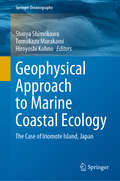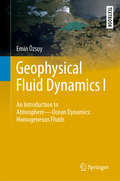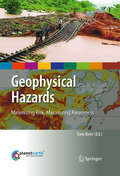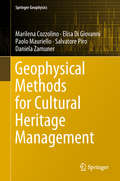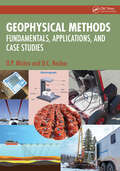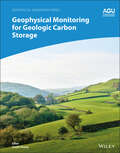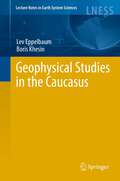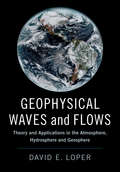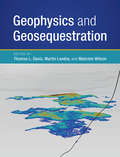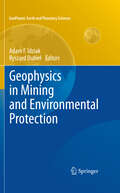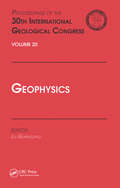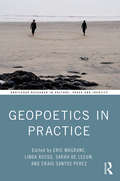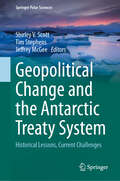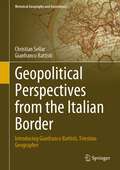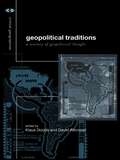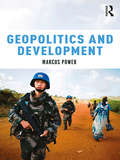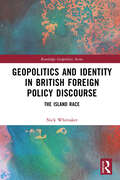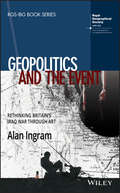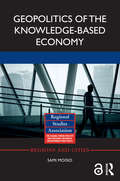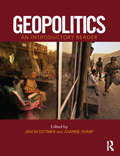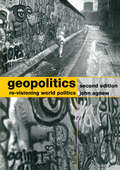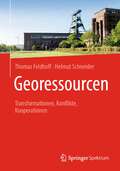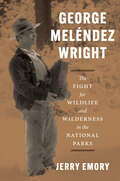- Table View
- List View
Geophysical Approach to Marine Coastal Ecology: The Case of Iriomote Island, Japan (Springer Oceanography)
by Shinya Shimokawa Tomokazu Murakami Hiroyoshi KohnoThis book presents recent results of collaborative studies in geophysics and ecology, focusing on the relationship between the physical environment and the distribution of the marine coastal ecosystems. The study area, the Sakiyamawan–Amitoriwan nature conservation area in Iriomote Island of Japan, is the only oceanic nature conservation area in the country. The area has no access roads, and the bay perimeter is uninhabited; therefore, it preserves the natural environment with very little human impact. In addition, it has various environmental gradients such as topography and inflows from rivers with mangrove forests which affect the distribution of marine coastal ecosystems such as those containing reef-building corals, sea grasses, and hermit crabs. For these reasons, the area is one of the best places for the study of the relationship between the physical environment and the distribution of the marine coastal ecosystems, a relationship that is important for their conservation but has not been investigated fully. This book is aimed at students and researchers in the fields of oceanography and marine coastal ecology as well as general readers who are interested in coral reefs, diving, and nature conservation.
Geophysical Fluid Dynamics I: An Introduction to Atmosphere—Ocean Dynamics: Homogeneous Fluids (Springer Textbooks in Earth Sciences, Geography and Environment)
by Emin ÖzsoyThis textbook develops a fundamental understanding of geophysical fluid dynamics by providing a mathematical description of fluid properties, kinematics and dynamics as influenced by earth’s rotation. Its didactic value is based on elaborate treatment of basic principles, derived equations, exemplary solutions and their interpretation.Both starting graduate students and experienced scientists can closely follow the mathematical development of the basic theory applied to the flow of uniform density fluids on a rotating earth, with (1) basic physics introducing the "novel" effects of rotation for flows on planetary scales, (2) simplified dynamics of shallow water and quasi-geostrophic theories applied to a variety of steady, unsteady flows and geophysical wave motions, demonstrating the restoring effects of Coriolis acceleration, earth’s curvature (beta) and topographic steering, (3) conservation of vorticity and energy at geophysical scales, and (4) specific applications to help demonstrate the ability to create and solve new problems in this very rich field. A comprehensive review of the complex geophysical flows of the ocean and the atmosphere is closely knitted with this basic description, intended to be developed further in the second volume that addresses density stratified geophysical fluid dynamics.
Geophysical Fluid Dynamics II: Stratified / Rotating Fluid Dynamics of the Atmosphere—Ocean (Springer Textbooks in Earth Sciences, Geography and Environment)
by Emin ÖzsoyThis book develops a fundamental understanding of geophysical fluid dynamics based on a mathematical description of the flows of inhomogeneous fluids. It covers these topics:1. development of the equations of motion for an inhomogeneous fluid 2. review of thermodynamics 3. thermodynamic and kinetic energy equations 4. equations of state for the atmosphere and the ocean, salt, and moisture effects 5. concepts of potential temperature and potential density 6. Boussinesq and quasi-geostrophic approximations 7. conservation equations for vorticity, mechanical and thermal energy instability theories, internal waves, mixing, convection, double-diffusion, stratified turbulence, fronts, intrusions, gravity currentsGraduate students will be able to learn and apply the basic theory of geophysical fluid dynamics of inhomogeneous fluids on a rotating earth, including:1. derivation of the governing equations for a stratified fluid starting from basic principles of physics 2. review of thermodynamics, equations of state, isothermal, adiabatic, isentropic changes 3. scaling of the equations, Boussinesq approximation, applied to the ocean and the atmosphere 4. examples of stratified flows at geophysical scales, steady and unsteady motions, inertia-gravity internal waves, quasi-geostrophic theory 5. vorticity and energy conservation in stratified fluids6.boundary layer convection in stratified containers and basins
Geophysical Hazards
by Tom BeerThis volume, written by the Hazards Science Team of the International Year of Planet Earth, brings together some of the most influential international scientists dealing with Natural Hazards and Society's response to natural hazards. It recognises that hazards, like poverty, will always be with us but that concerted and organised societal response can prevent a hazard becoming a disaster. By bringing together geoscientists, social scientists and those concerned with the administration of international science and international disaster reduction, this book details the state-of-the-science as well as the state-of-the-response in natural hazards.
Geophysical Methods for Cultural Heritage Management (Springer Geophysics)
by Salvatore Piro Marilena Cozzolino Elisa Di Giovanni Paolo Mauriello Daniela ZamunerThis book provides information and tools necessary to bridge and integrate the knowledge gaps related to the acquisition and processing of archaeological data, specifically in the field of preventive diagnostics, urban centers, archaeological parks and historical monuments, through activities that involve the application of non-invasive diagnostic detection systems, in the field of applied geophysics. The principal aim of this book is to define a tool for experts that work in the frame of Cultural Heritage and to identify a procedure of intervention transferable and usable in different geographical contexts and areas of investigations: it could help to decide the better technique of investigation to apply in relation to the predictive characteristics of the archaeological site and the objectives of the survey. The book is divided in two parts. The first one explains the theory of ground high resolution penetrating radar (GPR), electrical resistivity tomography (ERT), controlled source electromagnetism system, differential magnetic method and the scenario of integrated methods of different geophysical techniques. Each section covers the basic theory (complete description of the physical parameters involved in the method), field instruments (description of all systems actually offered by commercial companies), field techniques (presentation of the main procedures and setting parameters used to explore the ground surface during data acquisition), techniques of data processing and representation (main processing routines and comparison between different techniques; presentation of different typologies of graphical representation), and the possibility and limitations of methods (explanation of best and worst conditions of implementation of the geophysical technique in relation to the contrasts between archaeological features and the natural background and the features of the instruments and arrays). The second part describes some applications of geophysical prospection to Cultural Heritage in detailed case histories, divided in sections relative to monuments, historical buildings, urban centres, archaeological parks and ancient viability. Moreover, examples of integration of three-dimensional reliefs and geophysical diagnostic of a monuments and studies of large scale reconnaissance implemented into a Geographical Information System are treated. In each case study the authors cover the description of the archaeological or historical contest; an explanation of the problem to solve; a choice of the geophysical methods; the setting of the procedure of data acquisition; techniques of data processing; a representation, interpretation, and discussion of the results.
Geophysical Methods: Fundamentals, Applications, and Case Studies
by O.P. Mishra D.C. NaskarThis book includes a complete background on geophysical methods of exploration, practices, and case histories for a better understanding of the subject of geophysics and its applicability in diverse fields of exploration. It details both conventional and advanced geophysical techniques, with descriptions of the physics involved in different methodologies. Divided into 16 chapters, the book includes detailed discussions of the theory of individual methods, the operation of specific instruments, the presentation of results, and their interpretation.Features: Discusses potential geophysical methods and applications in mineral exploration Reviews natural hazard risk mitigation using geophysical methods Covers surface, air, marine, and well logging geophysical applications in natural resource exploration Includes electrical, electromagnetic, seismic, and radioactive geophysical methods supported by successful case histories Strengthens mathematical and problem-solving skills covering all the geophysical aspects This book is aimed at graduate and post-graduate students in applied geophysics, exploration geophysics, marine geophysics, engineering, and environmental geophysics.
Geophysical Monitoring for Geologic Carbon Storage (Geophysical Monograph Series)
by Lianjie HuangGeophysical Monitoring for Geologic Carbon Storage Geophysical Monitoring for Geologic Carbon Storage Storing carbon dioxide in underground geological formations is emerging as a promising technology to reduce carbon dioxide emissions in the atmosphere. A range of geophysical techniques can be deployed to remotely track carbon dioxide plumes and monitor changes in the subsurface, which is critical for ensuring for safe, long-term storage. Geophysical Monitoring for Geologic Carbon Storage provides a comprehensive review of different geophysical techniques currently in use and being developed, assessing their advantages and limitations. Volume highlights include: Geodetic and surface monitoring techniques Subsurface monitoring using seismic techniques Subsurface monitoring using non-seismic techniques Case studies of geophysical monitoring at different geologic carbon storage sites The American Geophysical Union promotes discovery in Earth and space science for the benefit of humanity. Its publications disseminate scientific knowledge and provide resources for researchers, students, and professionals.
Geophysical Studies in the Caucasus
by Lev Eppelbaum Boris KhesinThe subject of this book is the methodology and results of integrated geophysical investigations in the Caucasian region, mainly interpretation of magnetic and gravity anomalies with utilization of a huge petrophysical database for the evaluation of geological structure and mineral resources. Relative voluminous geophysical data are useful for the Earth Sciences researchers interested in the Caucasian region (and adjacent and similar regions) characterized by complicated geological structure, inclined magnetization (polarization), uneven topography and mountain/sea transition. Examination of geophysical fields verified by super-deep wells drilling indicates that magmatic rocks of the Lesser Caucasus are extended northward under thick sedimentary cover of the Kura Depression up to the Greater Caucasus. These rocks form hidden petroleum-bearing traps of a newly identified type. On the basis of geophysical studies (mainly inexpensive magnetic and electric methods), a new copper-polymetallic province in the Greater Caucasus has been revealed. a newly developed integrated approach and special information-statistical techniques for processing and interpretation of geophysical data facilitate detection of important geological features, e.g. hidden intersections of linear structures that control location of large commercial ore and oil-and-gas deposits, as well as focuses of dangerous geodynamic events at a depth. Numerous illustrations (including colour) elucidate different problems and solutions on various scales and in diverse geological-geophysical environments. Many aspects of this book have been presented at the teaching courses for bachelors, masters and doctors at the Tel-Aviv University (Tel Aviv, Israel) and Ben-Gurion University (Be'er-Sheva, Israel). Benefits to readers are predetermined by the combination of the authors many-years personal experience in the geophysical studies of Azerbaijan and other regions of the Caucasus with the authors' knowledge of the modern level of geophysics in the world.
Geophysical Waves and Flows: Theory and Applications in the Atmosphere, Hydrosphere and Geosphere
by David E. LoperWaves and flows are pervasive on and within Earth. This book presents a unified physical and mathematical approach to waves and flows in the atmosphere, oceans, rivers, volcanoes and the mantle, emphasizing the common physical principles and mathematical methods that apply to a variety of phenomena and disciplines. It is organized into seven parts: introductory material; kinematics, dynamics and rheology; waves in non-rotating fluids; waves in rotating fluids; non-rotating flows; rotating flows; and silicate flows. The chapters are supplemented by 47 'fundaments', containing knowledge that is fundamental to the material presented in the main text, organized into seven appendices: mathematics; dimensions and units; kinematics; dynamics; thermodynamics; waves; and flows. This book is an ideal reference for graduate students and researchers seeking an introduction to the mathematics of waves and flows in the Earth system, and will serve as a supplementary textbook for a number of courses in geophysical fluid dynamics.
Geophysics and Geosequestration
by Malcolm Wilson Thomas L. Davis Martin LandrøGeosequestration involves the deep geological storage of carbon dioxide from major industrial sources, providing a potential solution for reducing the rate of increase of atmospheric concentrations of carbon dioxide and mitigating climate change. This volume provides an overview of the major geophysical techniques and analysis methods for monitoring the movement and predictability of carbon dioxide plumes underground. Comprising chapters from eminent researchers, the book is illustrated with practical examples and case studies of active projects and government initiatives, and discusses their successes and remaining challenges. A key case study from Norway demonstrates how governments and other stake-holders could estimate storage capacity and design storage projects that meet the requirements of regulatory authorities. Presenting reasons for embracing geosequestration, technical best practice for carbon management, and outlooks for the future, this volume provides a key reference for academic researchers, industry practitioners and graduate students looking to gain insight into subsurface carbon management.
Geophysics for the Mineral Exploration Geoscientist
by Michael Dentith Stephen T. MudgeProviding a balance between principles and practice, this state-of-the-art overview of geophysical methods takes readers from the basic physical phenomena, through the acquisition and processing of data, to the creation of geological models of the subsurface and data interpretation to find hidden mineral deposits. Detailed descriptions of all the commonly used geophysical methods are given, including gravity, magnetic, radiometric, electrical, electromagnetic and seismic methods. Each technique is described in a consistent way and without complex mathematics. Emphasising extraction of maximum geological information from geophysical data, the book also explains petrophysics, data modelling and common interpretation pitfalls. Packed with full-colour figures, also available online, the text is supported by selected examples from around the world, including all the major deposit types. Designed for advanced undergraduate and graduate courses in minerals geoscience, this is also a valuable reference for professionals in the mining industry wishing to make greater use of geophysical methods.
Geophysics in Mining and Environmental Protection
by Adam F. Idziak Ryszard DubielThis book contains contributions to the 32nd Polish-Czech-Slovak Symposium on Mining and Environmental Geophysics held in May 2009 in Piechowice (Poland). The papers are related to various aspects of geophysical science such as induced seismicity, engineering seismology, environmental geophysics and geophysics in geology
Geophysics: Proceedings of the 30th International Geological Congress, Volume 20
by Liu GuangdingThis book aims to map the Precambrian basement, to recognize the paleo-suture zones, and to determine the nature of ancient tectonic regime. It proposes the new concepts of the basement tectonic framework and major tectonic features.
Geopoetics in Practice (Routledge Research in Culture, Space and Identity)
by Sarah De Leeuw Linda Russo Eric Magrane Craig Santos PerezThis breakthrough book examines dynamic intersections of poetics and geography. Gathering the essays of an international cohort whose work converges at the crossroads of poetics and the material world, Geopoetics in Practice offers insights into poetry, place, ecology, and writing the world through a critical-creative geographic lens. This collection approaches geopoetics as a practice by bringing together contemporary geographers, poets, and artists who contribute their research, methodologies, and creative writing. The 24 chapters, divided into the sections “Documenting,” “Reading,” and “Intervening,” poetically engage discourses about space, power, difference, and landscape, as well as about human, non-human, and more-than-human relationships with Earth. Key explorations of this edited volume include how poets engage with geographical phenomena through poetry and how geographers use creativity to explore space, place, and environment. This book makes a major contribution to the geohumanities and creative geographies by presenting geopoetics as a practice that compels its agents to take action. It will appeal to academics and students in the fields of creative writing, literature, geography, and the environmental and spatial humanities, as well as to readers from outside of the academy interested in where poetry and place overlap.
Geopolitical Change and the Antarctic Treaty System: Historical Lessons, Current Challenges (Springer Polar Sciences)
by Shirley V. Scott Tim Stephens Jeffrey McGeeThis book explores how geopolitical tensions have shaped the Antarctic Treaty System (ATS) and offers insights into managing future challenges. The ATS, established with the 1959 Antarctic Treaty during the Cold War, has been a successful model of international governance, ensuring Antarctica's peaceful use and environmental protection. However, the ATS now faces new pressures, including an expanded membership of 57 states, increased economic activities such as tourism, fishing, and bio-prospecting, and the impacts of climate change. These factors are exacerbating geopolitical tensions that could challenge the stability of the ATS. The book examines key moments in the history of the ATS to understand how past tensions were managed and what lessons can be drawn for the future. The volume covers the creation of the CCAMLR marine conservation treaty in the late 1970s-1980s; the developing world's opposition to the ATS in United Nations debates during the 1980s-1990s; the shift from permitting Antarctic mining to establishing the Madrid Protocol on Environmental Protection in the early 1990s; the formation of the International Association of Antarctic Tourism Operators; the management of Illegal, Unregulated, and Unreported (IUU) fishing in the 2000s; and the proposals for marine protected areas under the CCAMLR Convention in recent years. Several contributions also draw on critical and regional perspectives to make sense of geopolitical pressures on Antarctic governance and how they might play out over the years and decades ahead. Through its attention both to critical turning points in the history of the ATS, and a broad range of conceptual approaches, the book provides an authoritative assessment of the ATS's capacity to address emerging geopolitical stresses and provides strategies for future governance. It is a timely resource for understanding the evolving dynamics in Antarctica and ensuring the region remains a zone of peace and scientific collaboration. This book is a companion volume to McGee, Edmiston and Haward, 2022, The Future of Antarctica: Scenarios form Classical Geopolitics, in the Springer Polar Sciences Series.
Geopolitical Perspectives from the Italian Border: Introducing Gianfranco Battisti, Triestino Geographer (Historical Geography and Geosciences)
by Christian Sellar Gianfranco BattistiThis book presents the work of Gianfranco Battisti, on Geopolitics and Border Geographies in north-eastern Italy, Europeanization, and Globalization, contributing to debates on the inclusion of non-English speaking scholars in international geography. It highlights the institutions and cultures that shaped more than fifty years of his writing, as they emerged through his biography, theoretical contributions, and methods. Battisti uses historical geographies as tools to explain contemporary geopolitics while maintaining a high attentiveness to data-driven research. He applies these tools to investigate ‘geographical facts’ at the local, regional and global scale, viewed from the distinctive viewpoint of the city of Trieste, a laboratory of geopolitical change for more than two centuries.To better understand the importance of place in the production of geographical theories and methods, this book discusses Battisti’s biography in the context of the Triestino School of geography that started from the same French and German classics that shaped Anglo-American geography in the 19th century to later express original features. This book explains such features by introducing the concept of Geography as an industry that operates in a local and global context. It then deploys the methods Battisti developed within his school to discuss the realities and problems of borderlands in a historic and local context during the first and second World Wars and the geopolitical rationale that shaped the times between. The book continues to give an outlook, on how Europe reconstructed itself geopolitically, the implications thereof, and a comparison of how this fits in with geopolitical agendas on a global scale.
Geopolitical Traditions: Critical Histories of a Century of Geopolitical Thought (Critical Geographies #Vol. 7)
by Klaus Dodds David AtkinsonCondemned as an intellectul poison by the late American geographer Richard Hartshbornem geopolitics has confounded its critics. Today it remains a popular and important intellectul field despite the persistent allegations that geopolitics helped to legitimate Hitler's policies of spatial expansionism and the domination of place. Using insights from critical geopolitics and cultural history, the contributoirs focus on how geopolitics has been created, negotiated and contested within a variety of intellectual and popular contexts. Geopolitical Traditions argues that geopolitics has to take responsibility for the past whilst at the same time reconceptualising geopolitics in a manner which accounts for the dramatic changes in the late twentieth century. The book is divided into three sections: firstly Rehtinking Geopolitical Histories concentrates on how geopolitical conversations between European scholars and the wider world unfolded; secondly Geopolitics, Nationa and Spirituality considers how geopolitical writings have been strongly influenced by religions, iconography adn doctrine with examples drawn from Catholicicsm, Judaism and Hinduism; and thirdly Reclaiming and Refocusing Geopolitics contemplates how geopolitics has been reformulated in the post-war period with illustrations from France and the United States. Geopolitical Traditions brings together scholars working in a variety of disciplines and locations in order to explore a hundred years of geopolitical thought. Sanjay Chaturedi Punjab University, India. Paul Claval, Eaubonne, France . Michael J. Heffernan Notingham University, UK, Les Hepple University of Bristol.
Geopolitics and Development
by Marcus PowerGeopolitics and Development examines the historical emergence of development as a form of governmentality, from the end of empire to the Cold War and the War on Terror. It illustrates the various ways in which the meanings and relations of development as a discourse, an apparatus and an aspiration, have been geopolitically imagined and enframed. The book traces some of the multiple historical associations between development and diplomacy and seeks to underline the centrality of questions of territory, security, statehood and sovereignty to the pursuit of development, along with its enrolment in various (b)ordering practices. In making a case for greater attention to the evolving nexus between geopolitics and development and with particular reference to Africa, the book explores the historical and contemporary geopolitics of foreign aid, the interconnections between development and counterinsurgency, the role of the state and social movements in (re)imagining development, the rise of (re)emerging donors like China, India and Brazil, and the growing significance of South–South flows of investment, trade and development cooperation. Drawing on post-colonial and postdevelopment approaches and on some of the author’s own original empirical research, this is an essential, critical and interdisciplinary analysis of the complex and dynamic political geographies of global development. Primarily intended for scholars and post-graduate students in development studies, human geography, African studies and international relations, this book provides an engaging, invaluable and up-to-date resource for making sense of the complex entanglement between geopolitics and development, past and present.
Geopolitics and Identity in British Foreign Policy Discourse: The Island Race (Routledge Geopolitics Series)
by Nick WhittakerThis is the first book to examine Britain’s geopolitical identity and how it is expressed in foreign policy discourse. It demonstrates how British imperial thought, related to its island status, has remained important for British Members of Parliament in their debates of contemporary issues. It presents an exciting and provocative new reading of modern British foreign policy that decentres traditional notions of rationalism and pragmatism by foregrounding the much-neglected aspects of identity and geopolitical space. As British foreign policy-makers wrestle with how to define Britishness outside of the EU, this analysis provides a fresh perspective. It presents a much-needed historical contextualisation of long-standing concepts such as insularity from Europe and a universal aspect on world affairs. This book will be highly relevant for students, researchers and professionals that are seeking to understand British foreign policy. It will be of interest to those researching and working within geopolitics, identity, sociology, foreign policy analysis and international relations.
Geopolitics and the Event: Rethinking Britain's Iraq War Through Art (RGS-IBG Book Series)
by Alan IngramAn original exploration of the 2003 Iraq war and geopolitics more broadly through the prism of art. Offers a reappraisal of one of the most contentious and consequential events of the early twenty-first century Advances an original perspective on Britain’s role in the 2003 invasion and subsequent occupation of Iraq Maps out new ways of thinking about geopolitical events through art Examines the work of artists, curators and activists in light of Britain’s role as a colonial power in Iraq and the importance of oil Reflects on the significance, limits and dilemmas of art as a form of critical intervention Questions the implications of art in colonialism and modernity
Geopolitics of the Knowledge-Based Economy (Regions and Cities)
by Sami MoisioWe live in the era of the knowledge-based economy, and this has major implications for the ways in which states, cities and even supranational political units are spatially planned, governed and developed. In this book, Sami Moisio delves deeply into the links between the knowledge-based economy and geopolitics, examining a wide range of themes, including city geopolitics and the university as a geopolitical site. Overall, this work shows that knowledge-based "economization" can be understood as a geopolitical process that produces territories of wealth, security, power and belonging. This book will prove enlightening to students, researchers and policymakers in the fields of human geography, urban studies, spatial planning, political science and international relations.
Geopolitics: An Introductory Reader (Critical Geopolitics)
by Jason Dittmer Jo SharpIt has been increasingly impossible to think about our changing world without coming across the term 'geopolitics'. In the wake of the invasion and occupation of Iraq by the United States, United Kingdom, and others, geopolitics has been offered as an explanation for the occupation's failure to reinvent the Iraqi state and as a blueprint for future action. But what is 'geopolitics'? Drawing both on academic and political material, this book introduces readers to the concept of geopolitics, from the first usage of the term to its more recent reconceptualisations. The concept of geopolitics is introduced through four thematic sections - Imperial Geopolitics, Cold War Geopolitics, Geopolitics after the Cold War and Reconceptualising Geopolitics. Each section includes key writings from a range of diverse and leading authors such as Said, Agnew, Dalby, O Tuathail, Gregory, Barnett and Kaplan, and is accompanied by a critical introduction by the editors to guide the reader through the material. This Reader establishes the foundations of geopolitics while also introducing readers to the continuing significance of the concept in the 21st century. This Reader provides an essential resource that exposes students to original writing. The Editors provide a pathway through the material with Section Introductions to assist the readers understanding of the context of the material and impacts of the writings. The readings included draw from a range of authors, writing from a range of locations. The Reader concludes with the latest changes in geopolitical thought, incorporating feminist and other perspectives.
Geopolitics: Re-Visioning World Politics
by John AgnewGeopolitics identifies and scrutinizes the central features of geopolitics from the sixteenth century to the present. The book focuses on five key concepts of the modern geopolitical imagination: * Visualising the world as a whole * The definition of geographical areas as 'advanced' or 'primitive' * The notion of the state being the highest form of political organization * The pursuit of primacy by competing states * The necessity for hierarchy.
Georessourcen: Transformationen, Konflikte, Kooperationen
by Helmut Schneider Thomas FeldhoffGeoressourcen sind die Elemente des gesellschaftlichen Stoffwechsels mit der Natur: mineralische Rohstoffe, fossile Energieträger, Wasser, Luft, Böden und in einem weiteren Sinn auch die Biosphäre und das Klima. Mit der Inwertsetzung und Nutzung dieser Georessourcen sind zeitlich und räumlich stark variierende Mensch-Umwelt-Verhältnisse verbunden. Moderne Gesellschaften mit ihren vielschichtigen Verflechtungen sind so abhängig wie nie zuvor. Georessourcen sind dabei immer auch Instrument zur (Re-)Produktion von Machtverhältnissen und zur Durchsetzung politisch-ökonomisch-ideologischer Interessen im Rahmen von Geopolitik. Neben dem Klimawandel ist eine der großen und weiterhin unbeantworteten Zukunftsfragen die nach dem Umgang mit der Endlichkeit nicht erneuerbarer Georessourcen bei wachsendem Ressourcenverbrauch. Wie kann hier mehr Nachhaltigkeit im Sinne von Generationengerechtigkeit gelingen? Der vorliegende Band liefert eindrucksvolle Einblicke in die komplexen Wirkungsketten, die mit der Nutzung von Georessourcen verbunden sind – und die der Mensch in der Regel nicht vollständig kontrollieren kann. Verschiedene konzeptionelle, analytische und kritische Zugänge liefern wichtige Denkanstöße für Energie- und Ressourcenwenden jenseits von Geoengineering und anderen technologischen Innovationen. Denn ohne die Überwindung gewohnheitsmäßiger Denk-, Lebens- und Verhaltensweisen, die sich an fossil-kapitalistischen Wohlstandsmodellen orientieren, dürfte eine konfliktfreie Versorgung der Menschheit in Zukunft kaum zu gewährleisten sein.Das Buch richtet sich an die interdisziplinäre Fachwelt, an Praktiker, an Studierende und Lehrende aller Hochschultypen, die sich für die Schnittstellenthematik Mensch-Umwelt und die große Transformation zur Nachhaltigkeit interessieren.
George Meléndez Wright: The Fight for Wildlife and Wilderness in the National Parks
by Jerry EmoryThe first biography of a visionary biologist whose groundbreaking ideas regarding wildlife and science revolutionized national parks. When twenty-three-year-old George Meléndez Wright arrived in Yosemite National Park in 1927 to work as a ranger naturalist—the first Hispanic person to occupy any professional position in the National Park Service (NPS)—he had already visited every national park in the western United States, including McKinley (now Denali) in Alaska. Two years later, he would organize the first science-based wildlife survey of the western parks, forever changing how the NPS would manage wildlife and natural resources. At a time when national parks routinely fed bears garbage as part of “shows” and killed “bad” predators like wolves, mountain lions, and coyotes, Wright’s new ideas for conservation set the stage for the modern scientific management of parks and other public lands. Tragically, Wright died in a 1936 car accident while working to establish parks and wildlife refuges on the US-Mexico border. To this day, he remains a celebrated figure among conservationists, wildlife experts, and park managers. In this book, Jerry Emory, a conservationist and writer connected to Wright’s family, draws on hundreds of letters, field notes, archival research, interviews, and more to offer both a biography of Wright and a historical account of a crucial period in the evolution of US parks and the wilderness movement. With a foreword by former NPS director Jonathan B. Jarvis, George Meléndez Wright is a celebration of Wright’s unique upbringing, dynamism, and enduring vision that places him at last in the pantheon of the great American conservationists.
